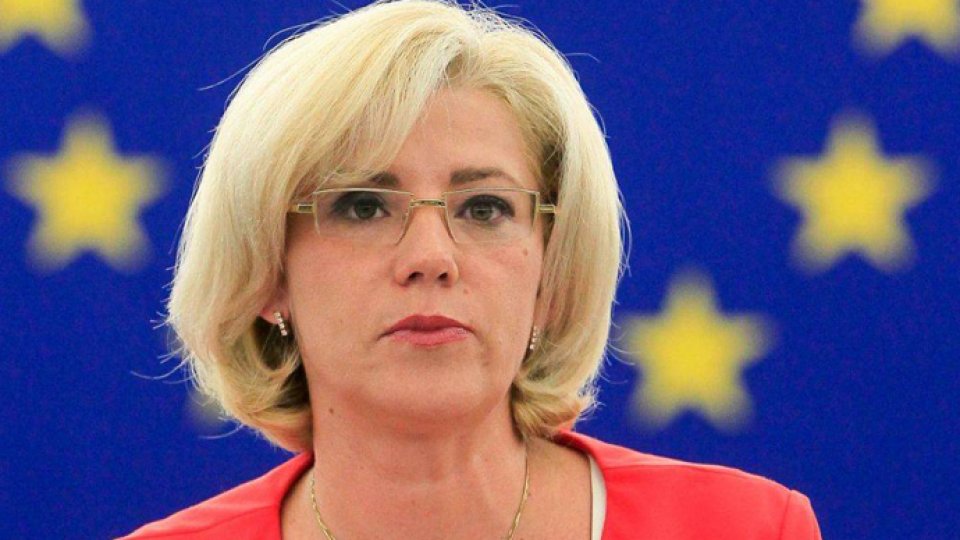RRA Exclusive Interview: Commissioner Creţu explains EU Cohesion Policy
European Commissioner Corina Creţu explained the EU Monetary Cohesion Policy and the Future of Europe after Brexit, in an exclusive interview offered on Tuesday, 29 May, for Radio Romania News (RRA).

Articol de Radu Dobriţoiu, 31 Mai 2018, 21:55
European Commissioner Corina Creţu explained the EU Monetary Cohesion Policy and the Future of Europe after Brexit, in an exclusive interview offered on Tuesday, 29 May, for Radio Romania News (RRA).
RRA Reporter Eugen Corioanu: You have presented the new modern Cohesion Policy envisioned for 2020 and beyond. Can you tell us which are the main coordinates?
Commissioner Corina Creţu: First of all, I think this is perhaps the most important moment of my mandate as a European Commissioner for Regional Policy. We have worked very much on this Regional and Cohesion Policy envisioned for after 2020. For the first time in the history of the EU, Cohesion is the most important policy, it is the main source of investment in Europe, being, as I always say, the most eloquent expression of solidarity and aimed at reducing economic, social and territorial disparities across Europe. So we are talking about the new Cohesion Policy for the 2021-2027 financial period. I believe that in the current context, when we have this sad fact - that the second largest contributor leaves the EU - when we have new priorities, we have succeeded in proposing a Cohesion Policy for all regions. You know very well that this issue has been questioned, but I do believe that we have to stick to a Cohesion Policy as it is has been signed in the Treaty, one that leaves nobody behind.
We have improved the flexibility of this policy in order to adapt it to the new priorities and, of course, to increase the protection of EU citizens. A great success is simplification, because now we come with a handbook for all seven funds, we have simplified the rules, and this will benefit everyone, from small business to entrepreneurs, schools, hospitals that will be able to get more money. Also, basically, there are only five priorities: first, an innovation policy to support small business, digital technologies, so a smart policy; second priority concerns investment in all regions, an adapted approach and initiatives at local level. Basically, after 2020 we will give more support to local, urban and territorial authorities, will be much more involved in the management of European funds, because we believe that regions and cities know better than Brussels what they need to invest and what their needs are. So, as I said, we have simplified access to funds, a single regulatory framework, adaptation to needs, and also a single level of audit control. From this point of view, I think we have a comprehensive budget. The Commission proposes to modernize the Cohesion Policy. We are confident that the EU economy is recovering and we are relying on a budget of 374 billion euros for all 27 Member States. Out of the 374 billion, 75% of resources will continue to be directed to the regions most in need of investment, thus to the least developed regions.
RRA Reporter Eugen Corioanu: Is the chapter about Romania already clarified?
Commissioner Corina Creţu: Absolutely, we have done and presented the calculation methodology. So Gross Domestic Product per capita is the main instrument, it has been used ever since 1999 to divide the budget and establish allocations by country. 80% of the indicators, as I said, consists of the Gross Domestic Product, added an indicator referring to the unemployment rate, especially among young people, another indicator related to the fight against climate change and another indicator, in fact a kind of prize for regions wishing to integrate migrants. According to all these indicators, Romania is among the most winning countries, Romania, Bulgaria and Greece - plus 8% compared with the previous period. It is important that this money is used on concrete projects to improve people's lives. And I think we have to start - I, of course, as a Commissioner, along with national and local authorities - to prepare projects in time to use this opportunity. For me this is the most moment of my mandate, because I know that Romania, and all the Member States, all regions, will all be able to use these solidarity funds.
Source:RRA.Translated by Miruna Matei














